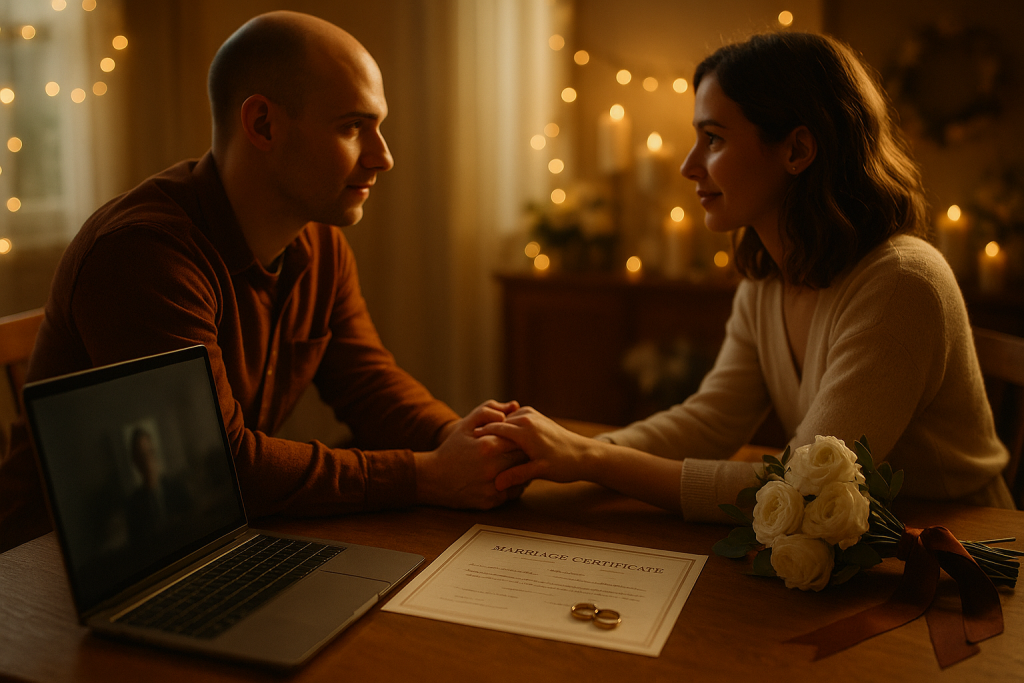Planning your wedding is an exciting journey, and choosing the right officiant is a crucial part of that process. Whether you’re opting for an online wedding or a traditional ceremony, ensuring your officiant is legally qualified to perform the marriage is essential. Here’s a comprehensive guide to help you verify your officiant’s credentials.
1. Understand Your State’s Requirements
Marriage laws vary by state, so it’s important to familiarize yourself with the specific requirements in your jurisdiction. Some states require officiants to be ordained ministers, while others may allow notaries or judges to perform ceremonies. For instance, in California, officiants are not required to register with the state, and it’s up to the couple to verify their officiant’s credentials. ([cdph.ca.gov](https://www.cdph.ca.gov/Programs/CHSI/Pages/Marriage-Officiant-Frequently-Asked-Questions.aspx?utm_source=openai))
2. Request Proof of Ordination
A legitimate officiant should be able to provide proof of their ordination. This could be an ordination certificate or a letter of good standing from the organization that ordained them. If your officiant was ordained online, ensure the ordaining organization is recognized in your state. ([theamm.org](https://theamm.org/articles/1486-how-to-tell-if-your-officiant-can-perform-a-legal-wedding?utm_source=openai))
3. Verify State Recognition of Ordination
Not all states recognize online ordinations. It’s crucial to confirm that your state acknowledges the ordination of your chosen officiant. For example, in New York City, officiants must register with the City Clerk’s Office to legally perform weddings. ([fivestarofficiants.com](https://www.fivestarofficiants.com/post/is-your-wedding-officiant-legally-registered-in-nyc-here-s-how-to-check?utm_source=openai))
4. Confirm State Registration
Some states require officiants to register with a government office before performing marriages. Check with your local county clerk’s office to see if this applies in your area. If registration is required, ask your officiant for proof of their registration.
5. Review the Officiant’s Experience and Reputation
Experience matters. An officiant with a solid track record is more likely to be familiar with the legalities and nuances of conducting a wedding ceremony. Look for reviews or testimonials from previous couples to gauge their professionalism and reliability. ([brides.com](https://www.brides.com/how-to-find-and-choose-your-wedding-officiant-5224142?utm_source=openai))
6. Discuss the Ceremony Details
Ensure your officiant is willing to tailor the ceremony to your preferences, whether it’s a virtual wedding or an in-person event. They should be open to incorporating personal elements that reflect your relationship.
7. Ensure Proper Handling of Legal Documents
Your officiant should be knowledgeable about the marriage license process, including how to complete and file it correctly. This ensures your marriage is legally recognized.
8. Be Aware of Red Flags
Be cautious of officiants who are reluctant to provide credentials, have no online presence, or demand cash-only payments. These could be signs of unprofessionalism or illegitimacy. ([theweddingzone.com](https://www.theweddingzone.com/vendor-credential-check/?utm_source=openai))
9. Consult with Local Authorities
If you’re unsure about your officiant’s credentials, contact your local marriage licensing office or county clerk. They can provide information on the requirements and help verify your officiant’s qualifications.
10. Consider Professional Associations
Officiants who are members of professional organizations often adhere to higher standards and ongoing education. This can be an added assurance of their commitment and legitimacy. ([christianofficiants.com](https://www.christianofficiants.com/credible-officiant-qualifications/?utm_source=openai))
FAQs
Q: Can a friend or family member officiate our wedding?
A: Yes, in many states, a friend or family member can officiate your wedding if they become legally ordained and meet state-specific requirements.
Q: How do I verify an online ordination?
A: Ask your officiant for their ordination certificate and confirm that the ordaining organization is recognized in your state.
Q: What if my state doesn’t recognize online ordinations?
A: If your state doesn’t recognize online ordinations, you’ll need to choose an officiant who meets the state’s legal requirements, such as a judge or a clergy member from a recognized religious organization.
Q: Do officiants need to register with the state?
A: It depends on the state. Some require officiants to register, while others do not. Check with your local county clerk’s office for specific requirements.
Q: What should I do if my officiant can’t provide proof of ordination?
A: If your officiant cannot provide proof of ordination, it’s advisable to choose another officiant who can ensure your marriage is legally recognized.
Ensuring your officiant is legally qualified is a vital step in your wedding planning process. By following these guidelines, you can have peace of mind knowing your marriage will be legally binding. If you have any questions or need assistance with your virtual wedding planning, feel free to contact us at Virtual Same Day Marriage. We’re here to help make your special day seamless and memorable.




